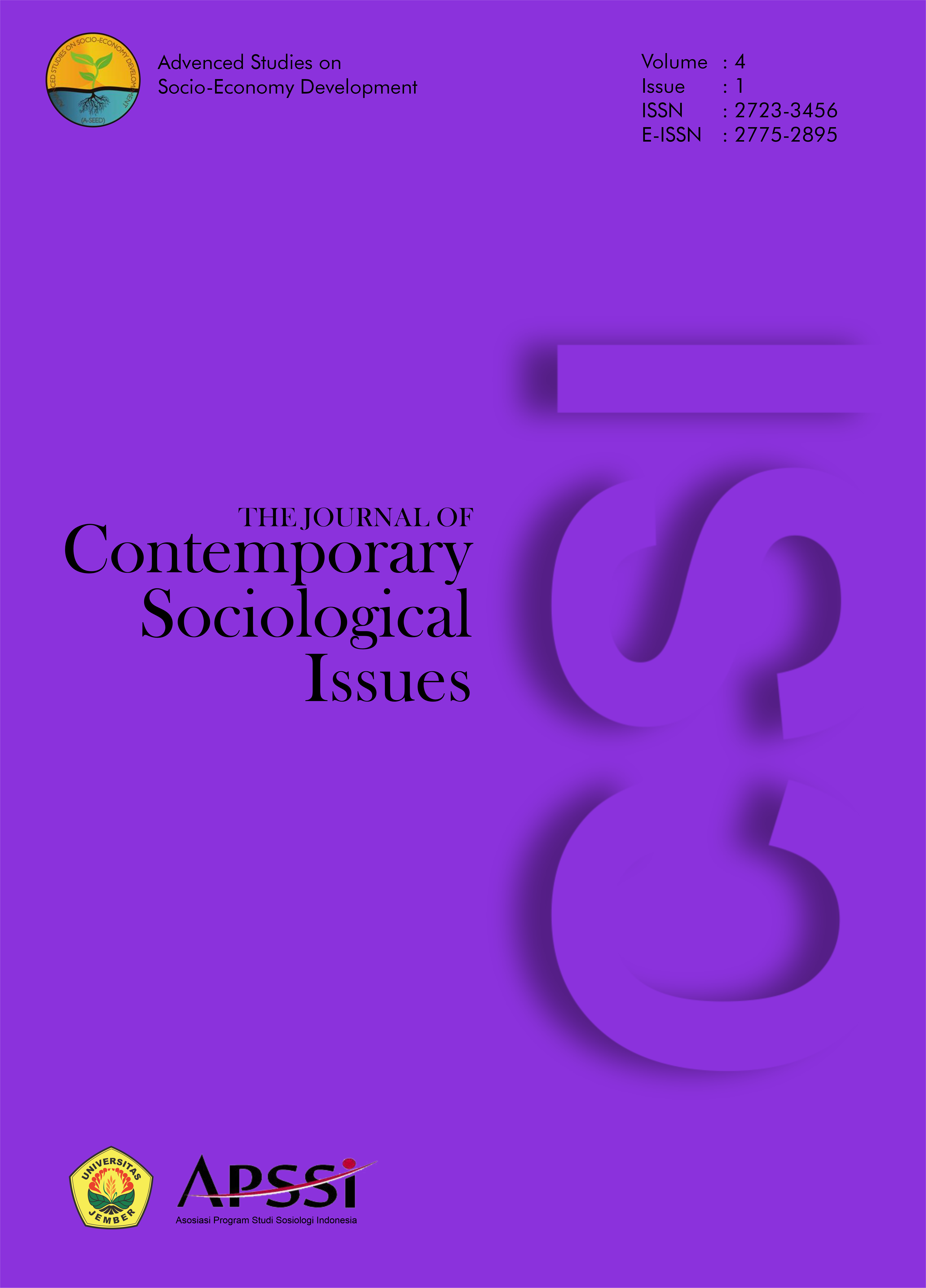Encouraging Islamic Hospitality with Indigenization in Indonesia and Malaysia
Abstract
Every society has struggled endlessly to maintain its identity since colonial times. One of them is the cultural concept of carrying out worship in a religion, which has been expanded massively through the cultivation of black-and-white ideology, right and wrong, or which means the truth of the teachings determines the obedience of religious people. However, this issue has become popular because many people want to be more compliant, so the migration movement is massive in society. This article examines that since Islamophobia emerged as a result of the 9/11 tragedy, Indonesia and Malaysia have conceptualized friendly Islam with the theme of religious moderation. This research uses a qualitative approach with the critical juncture method. Research findings show that in Malaysia, a multi-ethnic party won last year's elections after falling out with a Malay-Muslim party. Identity politics is quite strong in Indonesia. Meanwhile, Indonesia is busy promoting Wasatiyya Islam as a basic religion, and it was also promoted in the R20 last year. For years, these two countries have tried to become friendly countries for various ethnicities and religions. Thus, indigenization is more suitable because the two countries have similar traditions and cultures, so indigenization is important for politics and the state.
Keywords: Indigenization, Religious Moderation, 9/11 Tragedy, and Political Identity
References
Akmaliah, Wahyudi, Priyambudi Sulistiyanto, and Sukendar Sukendar. ‘Making Moderate Islam in Indonesia’. Studies in Conflict & Terrorism, 10 May 2022, 1–15.
Alatas, Syed Farid. ‘On the Indigenization of Academic Discourse’. Alternatives 18, no. 3 (1 July 1993): 307–38.
Aljunied, Syed Mohammed Ad’ha. ‘Countering Terrorism in Maritime Southeast Asia: Soft and Hard Power Approaches’. Journal of Asian and African Studies 47, no. 6 (2012): 652–65.
Anwar, Dewi Fortuna. ‘The Impact of Domestic and Asian Regional Changes on Indonesian Foreign Policy’. Southeast Asian Affairs 2010, no. 1 (2010): 126–41.
Béteille, André. ‘The Idea of Indigenous People’. Current Anthropology 39, no. 2 (1998): 187–92.
Borelli, Marguerite. ‘ASEAN Counter-Terrorism Weaknesses’. Counter Terrorist Trends and Analyses 9, no. 9 (2017): 14–20.
Bruinessen, Martin van. ‘Genealogies of Islamic Radicalism in Post-Suharto Indonesia’. South East Asia Research 10, no. 2 (1 July 2002): 117–54.
———. Indonesian Muslims in a Globalizing World: Westernisation, Arabisation, and Indigenizing Responses. The RSIS Working Paper Series 311, 2018.
Cammack, Mark. ‘Indonesia’s 1989 Religious Judicature Act: Islamization of Indonesia or Indonesianization of Islam?’ Indonesia, no. 63 (1997): 143–68.
Chia, Edmund Kee-Fook. ‘Wawasan 2020 and Christianity in Religiously Plural Malaysia’. In From Malaysia to the Ends of the Earth, edited by Elaine Wei-Fun Goh, Kah-Jin Jeffrey Kuan, Jonathan Yun-Ka Tan, and Amos Wai-Ming Yong, 119–38. Southeast Asian and Diasporic Contributions to Biblical and Theological Studies. Claremont Press, 2021.
Evers, Hans-Dieter. ‘Nusantara: History of a Concept’. Journal of the Malaysian Branch of the Royal Asiatic Society 89, no. 1 (310) (2016): 3–14.
Fareha, Nur. ‘Islam in Malaysia’s Domestic and Foreign Policy: General Overview’. Proceedings of Legal Internasional Conference and Studies, 2022.
———. ‘Role of Islam in Malaysia’s Public Diplomacy: Abdullah Badawi Administrations’. International Journal of Law Reconstruction 2, no. 1 (16 July 2018): 14–30.
Fealy, Greg. ‘Reformasi and the Decline of Liberal Islam’. In Activists in Transition: Progressive Politics in Democratic Indonesia, edited by Thushara Dibley and Michele Ford, 117–34. Cornell University Press, 2019.
Feener, R. Michael. ‘State Shariʿa and Its Limits: Reconfigurations of Practice, Community and Authority in Contemporary Aceh’. In Islam and the Limits of the State, edited by R. Michael Feener, David Kloos, and Annemarie Samuels, 1–23, 2016.
Fitriah, Ainul. ‘Pemikiran Abdurrahman Wahid Tentang Pribumisasi Islam’. Teosofi: Jurnal Tasawuf Dan Pemikiran Islam 3, no. 1 (3 June 2013): 39–59.
Furlow, Christopher A. ‘Malaysian Modernities: Cultural Politics and the Construction of Muslim Technoscientific Identities’. Anthropological Quarterly 82, no. 1 (2009): 197–228.
Gerring, John. ‘Qualitative Methods’. Annual Review of Political Science 20, no. 1 (2017): 15–36.
Ghoshal, Baladas. ‘Arabization: The Changing Face of Islam in Asia’. India Quarterly 66, no. 1 (2010): 69–89.
Gray, Mel, and T. Hetherington. ‘Indigenization, Indigenous Social Work and Decolonization: Mapping the Theoretical Terrain’. In Decolonizing Social Work, 25–41. Routledge, 2016.
Hack, Karl. ‘Decolonization and Violence in Southeast Asia: Crises of Authority and Identity’. In Beyond Empire and Nation: Decolonizing Societies in Africa and Asia, edited by Els Bogaerts and Remco Raben, 137–66. Leiden: KITLV, 2012.
Hajura, Shella. ‘Shared Heritage Diplomacy of Indonesia and Malaysia as Soft Power in The Southeast Asia Region’. Jurnal Hubungan Internasional 10, no. 2 (10 January 2022): 84–95.
Hassan, Muhammad Haniff. ‘Wasatiyyah as Explained by Prof. Muhammad Kamal Hassan: Justice, Excellence and Balance’. Counter Terrorist Trends and Analyses 6, no. 2 (2014): 24–30.
Hassan, Sharifah Zaleha binte Syed. ‘History and the Indigenization of the Arabs in Kedah, Malaysia’. Asian Journal of Social Science 32, no. 3 (2004): 401–24.
Hoesterey, James. ‘Is Indonesia a Model for the Arab Spring? Islam, Democracy, and Diplomacy’. Review of Middle East Studies 47, no. 2 (1 July 2013): 157–65.
Hurd, Elizabeth Shakman. ‘Political Islam and Foreign Policy in Europe and the United States’. Foreign Policy Analysis 3, no. 4 (2007): 345–67.
Idrus, Rusaslina. ‘Competing for the “Indigenous” Slot: Layered Histories and Positionings in Peninsular Malaysia’. Sojourn: Journal of Social Issues in Southeast Asia 37, no. 1 (2022): 58–84.
Jubba, H., J. Awang, and S. A. Sungkilang. ‘The Challenges of Islamic Organizations in Promoting Moderation in Indonesia’. Wawasan: Jurnal Ilmiah Agama Dan Sosial Budaya 6, no. 1 (2021): 43–54.
Kato, Hisanori. ‘The Islam Nusantara Movement in Indonesia’. In Handbook of Islamic Sects and Movements, edited by Muhammad Afzal Upal and Carole M. Cusack, 110–28. Brill, 2021.
Mandaville, Peter Mandaville, and Shadi Hamid Hamid. ‘Islam as Statecraft: How Governments Use Religion in Foreign Policy’. Washington, DC United States: Brookings Institution, 16 November 2018.
Mitra, K. ‘Religion in Pre-Islamic Indonesia’. In Proceedings of the Indian History Congress 72 (2011): 1029–36.
Moustafa, Tamir. ‘Judging in God’s Name: State Power, Secularism, and the Politics of Islamic Law in Malaysia’. In Religious Rights, 267–82. Routledge, 2017.
Mujani, Wan, Ermy Rozali, and Nor Zakaria. ‘The Wasatiyyah (Moderation) Concept: Its Implementation In Malaysia’. Mediterranean Journal of Social Sciences 6, no. 4 (1 July 2015).
Murphy, Ann Marie. ‘Islam in Indonesian Foreign Policy: The Limits of Muslim Solidarity for the Rohingya and Uighurs’. The ASAN Institute for Policy Studies (blog), 2020. https://en.asaninst.org/contents/islam-in-indonesian-foreign-policy-the-limits-of-muslim-solidarity-for-the-rohingya-and-uighurs/.
Nubowo, Andar. ‘Promoting Indonesian Moderate Islam on the Global Stage: Non-State Actors’ Soft Power Diplomacy in the Post-New Order Era’. Muslim Politics Review 2, no. 2 (22 December 2023): 238–83.
Oddie, Geoffrey. ‘Indigenization and Nationalism / Indigénisation et Nationalisme’. Archives de Sciences Sociales Des Religions 103, no. 1 (1998): 129–52.
Ozturk, Ahmet Erdi. ‘Islam and Foreign Policy: Turkey’s Ambivalent Religious Soft Power in the Authoritarian Turn’. Religions 12, no. 1 (January 2021): 38.
Prins, Jan. ‘Some Notes About Islam and Politics in Indonesia’. Die Welt Des Islams 6, no. 1 (1959): 117–29.
Qomar, Mujamil. ‘Islam Nusantara: Sebuah Alternatif Model Pemikiran, Pemahaman, Dan Pengamalan Islam’. El Harakah: Jurnal Budaya Islam 17, no. 2 (2015): 198–217.
Rabasa, Angel M. ‘Southeast Asia: Moderate Tradition and Radical Challenge’. In The Muslim World After 9/11, 1st ed., 367–412. RAND Corporation, 2004.
Raymond, Gregory. ‘Religion as a Tool of Influence: Buddhism and China’s Belt and Road Initiative in Mainland Southeast Asia’. Contemporary Southeast Asia 42, no. 3 (9 December 2020): 346–71.
Robby, Hadza Min Fadhli. ‘Wacana Islam Nusantara Dan Islam Hadhari Dalam Politik Luar Negeri Indonesia Dan Malaysia’. Tashwirul Afkar 40, no. 2 (29 December 2021).
Saat, Norshahril, and Afra Atlatas. ‘Islamisation in Malaysia Beyond UMNO and PAS’ 2022, no. 96 (26 September 2022).
Saenong, Faried F. ‘Nahdlatul Ulama (NU): A Grassroot Movement Advocating Moderate Islam’. In Handbook of Islamic Sects and Movements, 121–50. Brill, 2021.
https://www.academia.edu/49881876/Nahdlatul_Ulama_NU_A_Grassroot_Movement_Advocating_Moderate_Islam.
Slater, Dan, and Erica Simmons. ‘Informative Regress: Critical Antecedents in Comparative Politics’. Comparative Political Studies 43, no. 7 (3 June 2010): 886–917.
Smock, David, and Qamar Huda. ‘Islamic Peacemaking Since 9/11’. DIANE Publishing 31 (1 March 2009).
Sukma, Rizal. ‘Soft Power and Public Diplomacy: The Case of Indonesia’. In Public Diplomacy and Soft Power in East Asia, 91–115. New York: Palgrave Macmillan US, 2011.
Suryadinata, Leo. ‘Islam and Suharto’s Foreign Policy: Indonesia, the Middle East, and Bosnia’. Asian Survey 35, no. 3 (1995): 291–303.
Syafrizal, Achmad. ‘Sejarah Islam Nusantara’. Islamuna: Jurnal Studi Islam 2, no. 2 (5 December 2015): 235–53.
Wahid, Abdurrahman. Tuhan Tidak Perlu Dibela. Lkis Pelangi Aksara, 1999.
Weatherbee, Donald E. ‘Indonesia’s Foreign Policy in 2016: Garuda Hovering’. Southeast Asian Affairs, 2017, 163–76.

This work is licensed under a Creative Commons Attribution-ShareAlike 4.0 International License.









